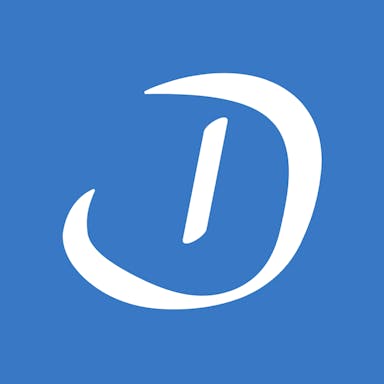Thesis
Europe is experiencing an increasing prevalence of chronic diseases and the shortage and burnout of healthcare professionals. EU government health expenditure was 5.9% of GDP in 1995, and grew to 8.1% in 2021. As the population ages, the demand for healthcare services increases the need for efficient and effective healthcare delivery. Digitization of healthcare has the potential to transform the industry, making it more efficient, cost-effective, and more patient-centered.
The healthcare industry in Europe is therefore ripe for technology adoption, and the COVID-19 pandemic only served to highlight further the need for digitization in healthcare as telemedicine became an essential tool for delivering care during lockdowns. The European digital health market is expected to grow from $35 billion in 2022 to $80 billion in 2027. Governments and healthcare providers have recognized the benefits of digitizing healthcare and are investing accordingly. In June 2021, the UK government pledged £395 million, the French government pledged €500 million, and the German government pledged €4.3 billion towards digitizing healthcare.
Doctolib is a healthcare booking platform and software provider. Founded in 2013 and based in Paris, France, Doctolib started as a scheduling platform but has been adding services, including telemedicine, messaging, and back-office operations management during the pandemic, to become an all-in-one solution for healthcare professionals. It also became the most valuable French startup in 2022.
Founding Story
Doctolib was cofounded by Stanislas Niox-Chateau (CEO), Thomas Landais (Co-Founder), Jessy Bernal (Technical Co-Founder), Ivan Schneider (CTO), and Steve Abou-Rjeily (Director of Sales) in 2013.
Niox-Chateau was born in Paris. He grew up stammering and had to work intensively with a speech pathologist to reduce his disability. As a child, he started to play tennis, training hard to become a professional player. At 12, he won an international tennis tournament. Unfortunately, at 17, he had to stop his professional tennis career after a back injury. In 2006, he was accepted into France's prestigious business school, HEC.
After his studies, he joined a company called Otium in 2010. At the time, this was a startup studio co-led by Pierre Edouard Stérin and Antoine Freysz. Freyzs recruited him after attending an oral presentation by HEC students in which they were presenting startup projects. When most students were showcasing 20 slides as asked, Niox-Chateau prepared a 300-slide deck to pitch a beauty appointment platform. Freysz said in response to this that Niox-Chateau “had met with beauty professionals and came up with a complete business model for a beauty appointment booking site.”
At Otium, Niox-Chateau contributed to launching a booking platform for beauty professionals called Balinea. He also worked on the turnaround of a restaurant booking platform called TheFork which was sold to Tripadvisor in 2014 in what represented a significant success for the young French tech ecosystem as a whole at the time. In July 2013, Niox-Chateau left Otium to build his own company, Doctolib, with four co-founders.
Doctolib was started as another booking management platform. This time, Niox-Chateau decided to go after the healthcare industry. When it launched its MVP in November 2013 with 50 doctors, Doctolib was late to the party. A dozen French startups were trying to replicate Zocdoc’s success in France, including companies like MonDocteur, Keldoc, Rendez-vous-facile, Clickrendezvous, and DocMe. MonDocteur had already raised €2.4 million from a French corporate called Lagardère and Keldoc €700K from business angels. In 2014, the company had convinced 1.5K healthcare professionals and 15 hospitals to work with it. In 2023, Doctolib has over 340K healthcare professionals using its product Doctolib Agenda, 5K using Doctolib Médecin, and 70 million patient accounts in France, Germany, and Italy.
Product
Doctolib Patient
Doctolib Patient was Doctolib’s initial product. It’s a booking management system for doctors. It has three main benefits: (1) it saves doctors one hour and thirty minutes per week in administrative tasks, (2) it reduces missed appointments by 60% and (3) it increases doctors’ revenues by attracting new patients, as Doctolib attracts 70 million patients every month on its website.
Patients go on Doctolib to book their medical appointments, and doctors can manage their daily booking schedule on the Doctolib Patient platform. Automatic SMS and email reminders are sent to reduce no-shows. Doctors can also use Doctolib Patient to communicate with patients and share documents like prescriptions. Finally, Doctolib Patient is connected with EHRs on the market.
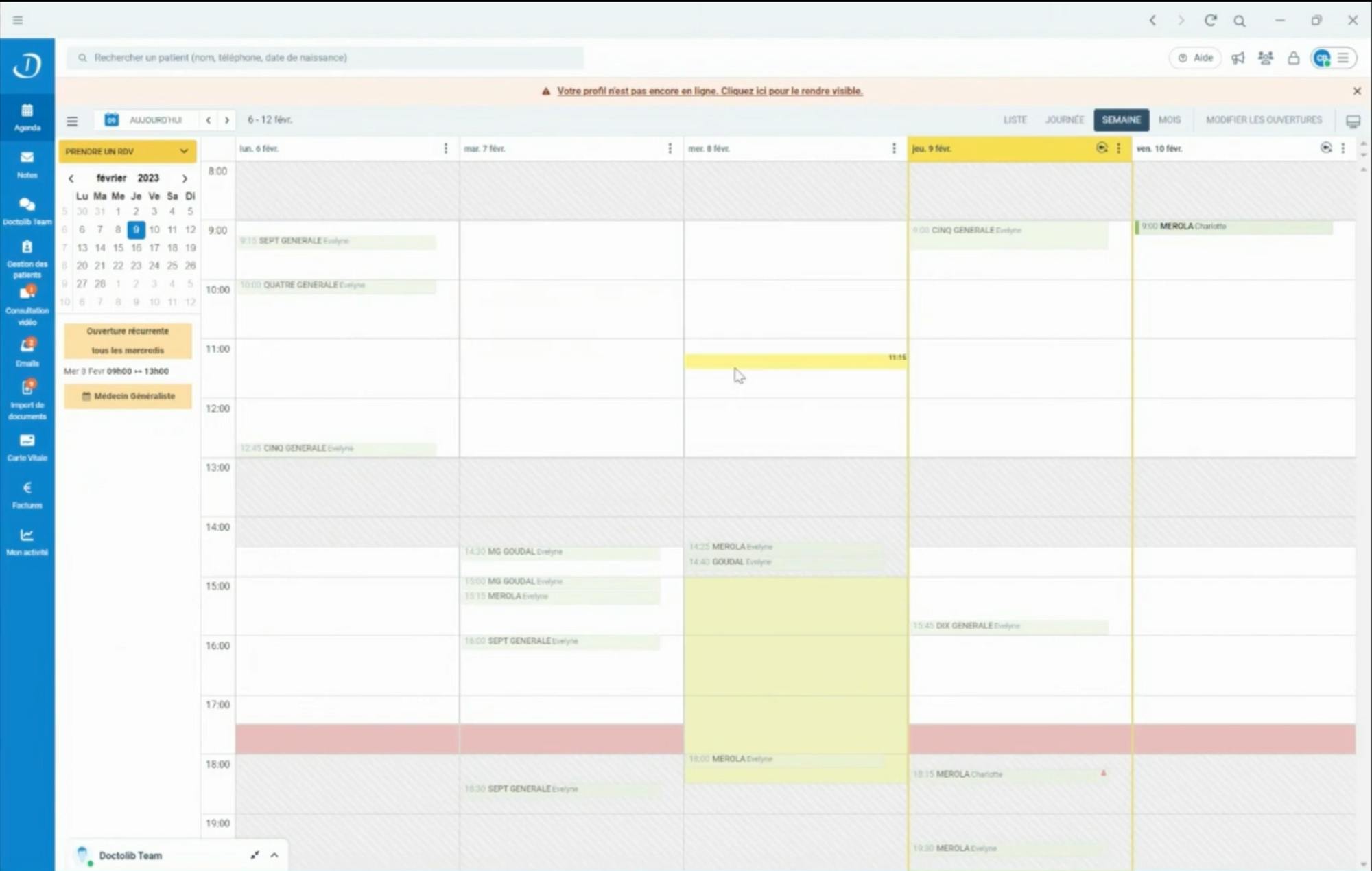
Source: Doctolib
Doctolib Médecin
Doctolib Médecin offers (1) patient management with the medical information and historical records about the patients, (2) document management to reduce manual entry or double entry, (3) consultation space to be more efficient while doctors treat patients, and (4) invoicing with automatic transmission to the French Social Security, which is a State organization that pays most medical costs.
Doctolib Médecin has industry-specific features such as pre-filled templates based on the symptoms observed by the doctor, an integration with a drugs library to make prescriptions, AI to identify the patient conditions and the nature of attached documents, and the ability to send to the State invoices to be reimbursed directly. It’s a €135 monthly SaaS product that doctors pay for separately from Doctolib Patient.
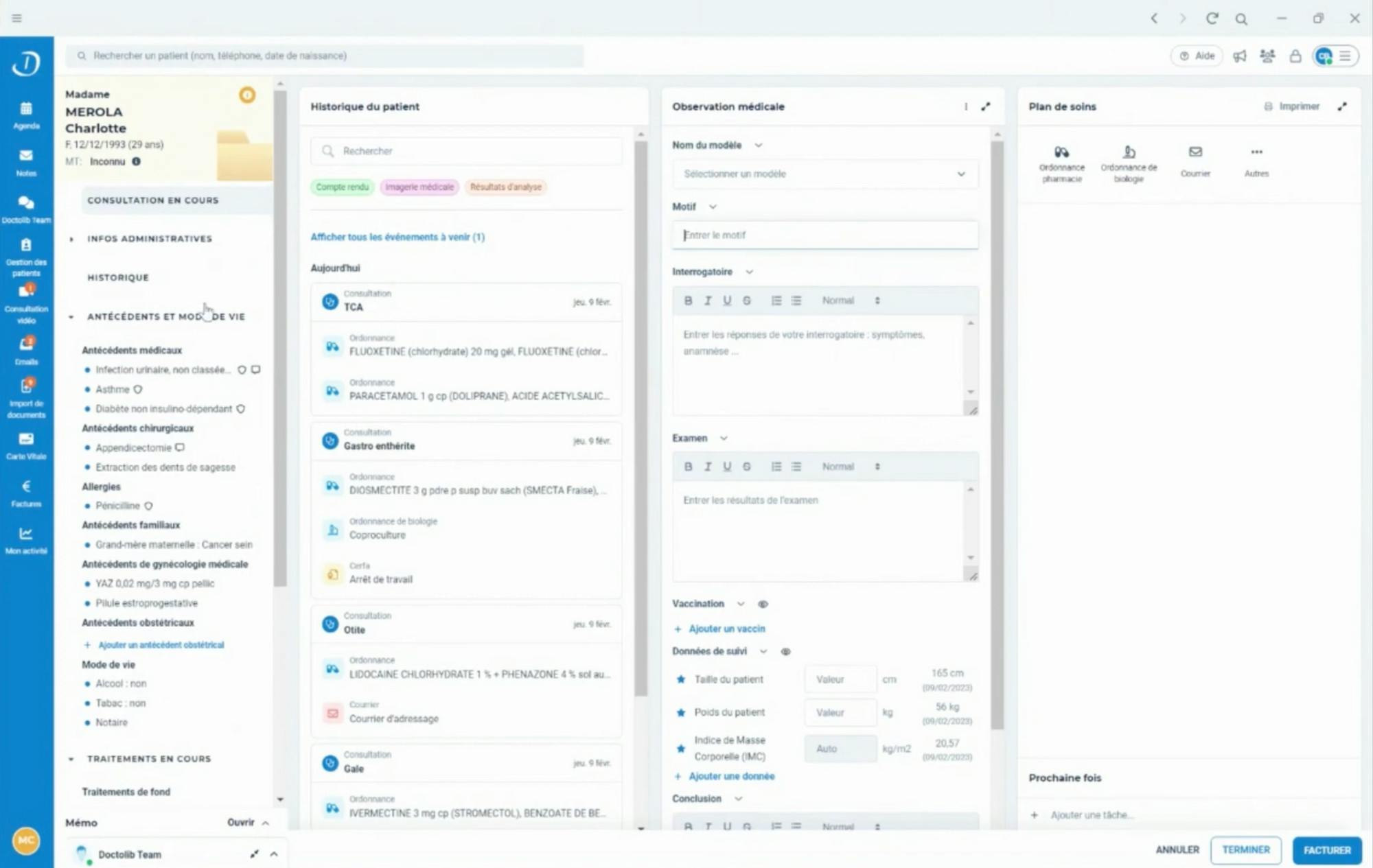
Source: Doctolib
Doctolib Team
Doctolib Team is a messaging app for healthcare professionals to exchange medical documents and collaborate on treating patients. It has a directory with 400K healthcare professionals in France, and it’s a secured platform encrypting medical data. It’s a free product that Doctolib uses as a lead generation mechanism to have exposure to doctors who are not yet customers.
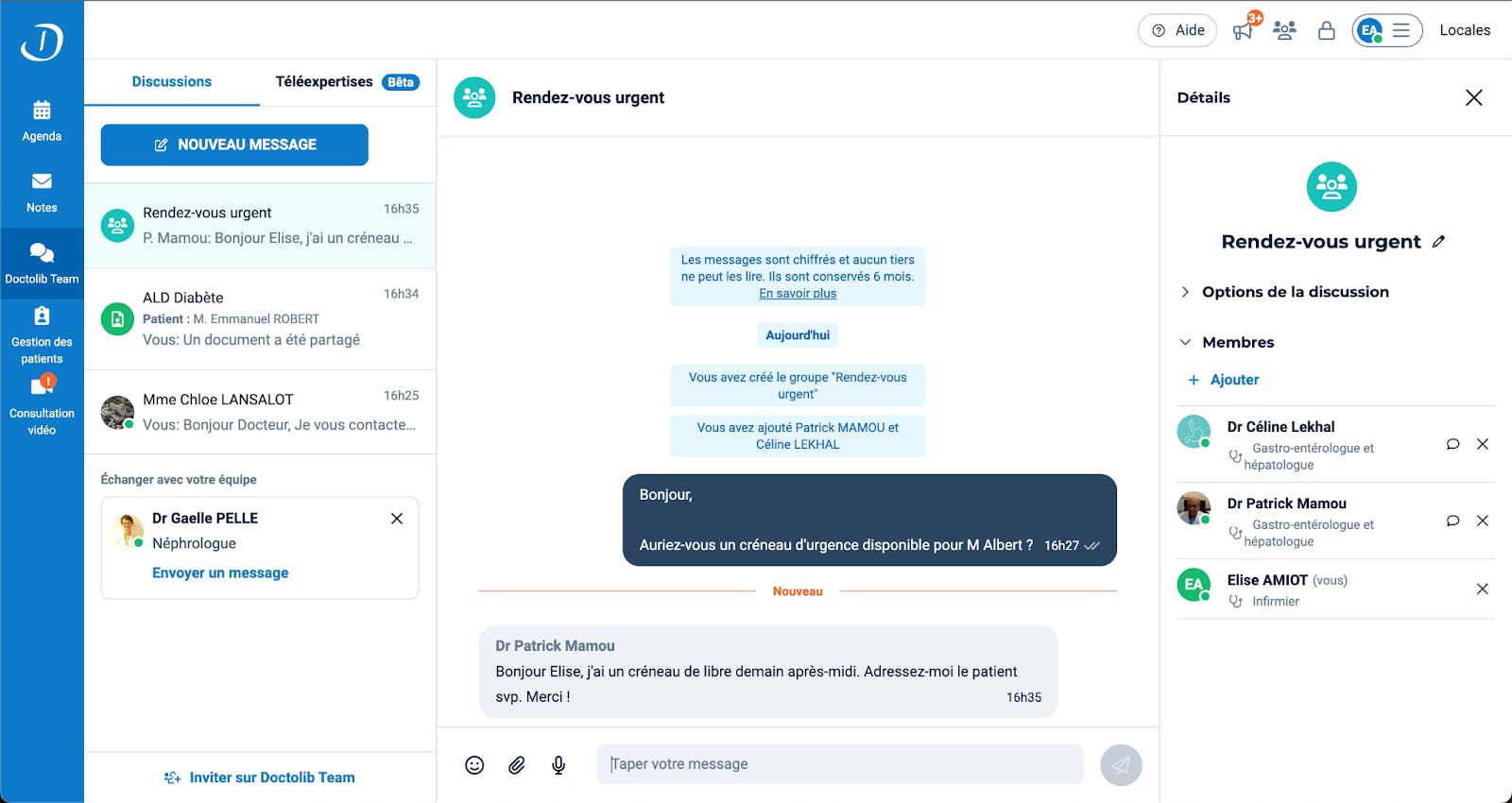
Source: Doctolib
Doctolib Téléconsultation
Doctolib Téléconsultation is a telemedicine product. It’s integrated into Doctolib Patient and Doctolib Médecin to create a seamless experience on both the doctor and patient sides. It also offers an integrated online payment method and a secure document-sharing solution. It’s used by 33K doctors and 6 million patients. Doctors must pay a €79 monthly subscription for this offering.
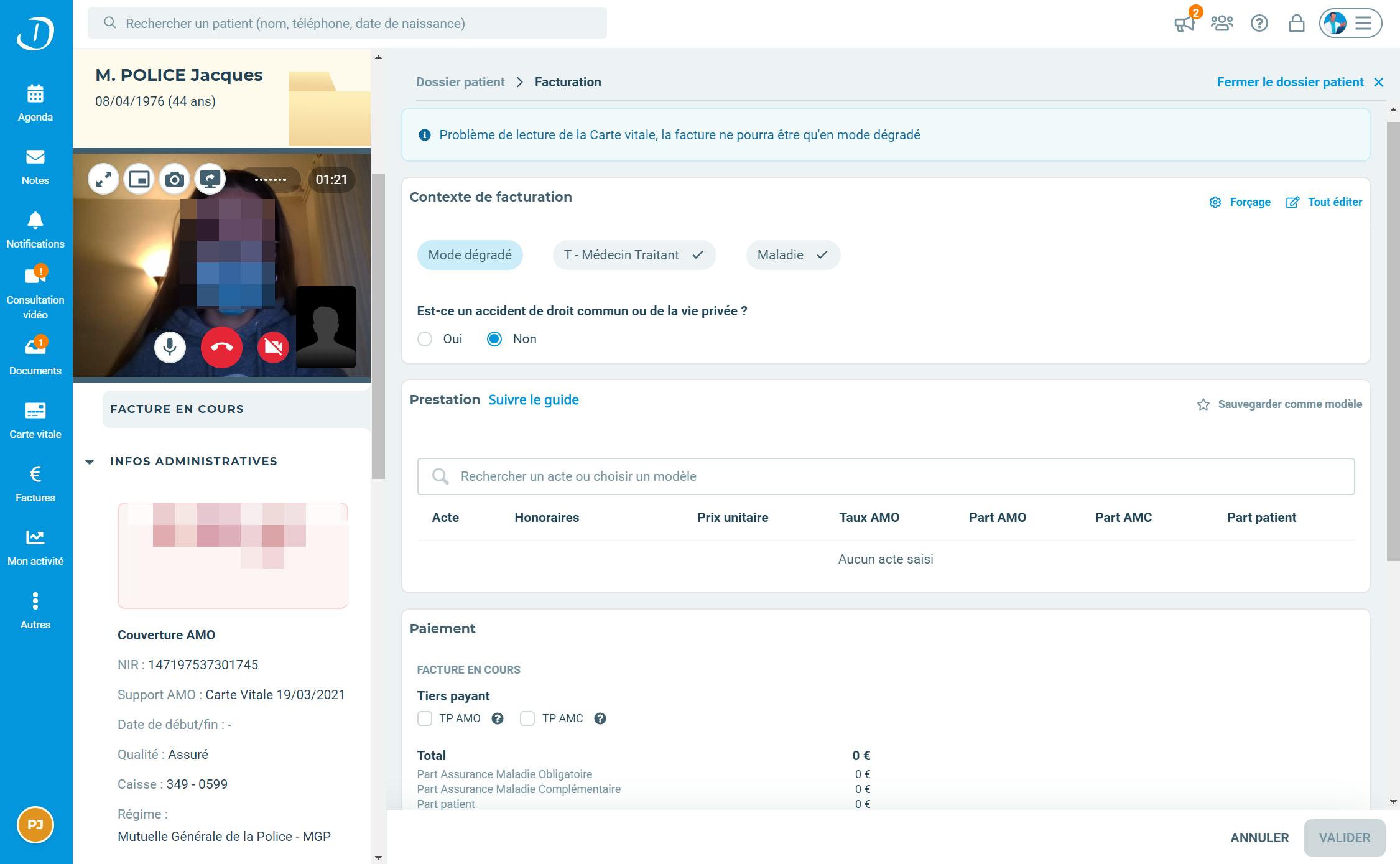
Source: Doctolib
Doctolib Lecteur
In France, everyone has a medical card called “la Carte Vitale” that allows French citizens to have their medical expenses reimbursed by the government. Doctolib Lecteur is a card reader for this medical card that can be connected to a computer or a smartphone (which is key for at-home care). Doctors can use the reader coupled with the Doctolib Pro mobile app to generate an invoice and transmit it to the government for patient reimbursement. Doctolib charges a €29 monthly subscription for this offering.
Doctolib Hospital
Doctolib Hospital is a dedicated offering for hospitals. It’s used by 260 hospitals in France. It packages Doctolib’s different products (booking management system, telemedicine, messaging app) into a single platform adapted for hospitals. It helps the hospital administrator be more efficient with a collaborative agenda for all the doctors and pre-qualification forms that patients must fill out before their appointments. Within the hospital, it facilitates coordination between doctors thanks to Doctolib’s messaging app.
Market
Customers
For healthcare professionals, Doctolib addresses all regulated specialties (general practitioners, dentists, osteopaths, pharmacists, opticians, psychologists, etc.). Healthcare professionals who have limited administrative staff to delegate tasks to are the core target market for Doctolib.
Doctolib also enables assistants and other administrative staff by enabling them to support healthcare professionals in managing their agenda and the follow-up tasks after the medical consultation (e.g., prescription, payments).
Finally, healthcare facilities use Doctolib to simplify access to healthcare for their patients and increase their healthcare professionals' productivity. They’re also the biggest target market for the Doctolib Teams offering, which works to streamline communications between healthcare professionals.
Market Size
Doctolib has a presence in France, Germany, and Italy. In France, there are about 215K healthcare professionals. In Germany, there are about 370K healthcare professionals. In Italy, there are about 240K healthcare professionals.
When it started, Doctolib went after an initial $273 million ARR market (€99 per month initial pricing for Doctolib Patient in France, multiplied by the 228K doctors in France). Overtime, Doctolib increased its addressable market to €4.5 billion by entering new geographies (such as Italy with 403K doctors and Germany with 416K doctors), increasing prices for Doctolib Patient (from €99 per month to €129 per month) and expanding its product suite (adding Doctolib Médecin, Doctolib Reader and Doctolib Telemedicine).
Business Model
Doctolib monetizes via a SaaS subscription from doctors who use its different solutions. Its booking management solution Doctolib Patient is a SaaS-enabled marketplace. It does not monetize via a take-rate when an appointment is made on the platform but via a €139 monthly subscription fee paid by doctors, which amounts to about €1.7K per year. Doctolib’s EHR Doctolib Médecin costs €1.6K/year, its telemedicine solution costs €900/year, and its card reader costs €300/year. A customer of all products can therefore pay up to €4.5K in subscription costs. Patients don’t pay to use Doctolib, and Doctolib does not monetize its data.
Traction
As of March 2022, 300K healthcare workers used Doctolib, and the company worked with 250 public hospitals. Doctolib operates in France, Germany, and Italy. France is still the company’s primary market; 60 million people have used Doctolib as of January 2022. In 2018, Doctolib acquired its direct competitor MonDocteur in France. In April 2020, Doctolib started offering its free telemedicine product in France. Over 31K doctors used the service in five weeks for over 2.5 million telemedicine consultations in total. It acquired Tanker in January 2022 to strengthen its security stack for healthcare data, Vettore Rinascimento in September 2022 to have an EHR for healthcare facilities, and Siilo in March 2023 to double down on Doctolib Teams. It also expanded in Italy in October 2021 with the acquisition of a local player.
Valuation
Doctolib was founded in 2013, and it took the company 6 years to reach a unicorn valuation when it raised a €150 million series D led by General Atlantic in March 2019. In March 2022, Doctolib announced a $549 million round in equity and debt with General Atlantic and Eurazeo, valuing the business at $6.4 billion.
If healthcare professionals were all independent and were paying Doctolib’s full price, it would imply that Doctolib generates €575 million in ARR (340K doctors paying €139 per month for Doctolib Patient, 5K doctors paying €135 per month for Doctolib Médecin). However, this figure is likely an overestimate as Doctolib has increased its prices over time and Doctolib also works with hospitals that pay less per doctor. However, such an ARR would mean that Doctolib is trading at about a 10x revenue multiple.
Competition
Doctolib has direct and indirect competitors for its three main products: its booking management system, EHR, and telemedicine platform. It has competitors in the geographies in which it operates (France, Italy, and Germany), but also in geographies it does not operate in yet but could expand into (e.g., Zocdoc in the US, Docplanner in Poland, and Kry in the Nordic countries).
Zocdoc
Zocdoc is a US-based booking management system started in 2007. It has raised $376 million in total as of March 2023, including a $150 million growth financing from Francisco Partners in 2021, and the company was valued at $1.8 billion in a funding round in 2015. Zocdoc operates only in the US because of US-specific features like the importance of booking an appointment with a doctor who accepts insurance. Zocdoc has expanded into telemedicine and given access to its product to developers via APIs. Zocdoc has not tried to expand beyond the US, but it’s a player that may be hard to disrupt for Doctolib if Doctolib tries to enter the US market.
Kry
Kry is a Sweden-based digital-powered primary and secondary care clinic chain started in 2015. It has raised $729 million of funding as of March 2023, including a $160 million Series D extension in July 2022. It started with a telemedicine product for primary before expanding into secondary care (mental health, women's health) and brick-and-mortar clinics. Kry operates in Sweden, Norway, the UK, Germany, and France. In France and Germany, it competes directly with Doctolib on telemedicine.
Docplanner
Docplanner is a Poland-based booking management system for doctors started in 2011. It has raised $141 million in total, including a $90 million Series E in May 2019. Docplanner operates in 13 countries in Europe (Poland, Spain, Italy, Germany, Czech Republic, Portugal, and Turkey) and Latin America (Brazil, Mexico, Colombia, Argentina, Peru, and Chile). It has 210K doctors, and 90 million patients use its solution monthly. Doctolib competes directly with Docplanner in Italy and Germany.
Key Opportunities
Upselling
In March 2021, Doctolib launched Doctolib Médecin. Upselling Doctolib Médecin to doctors already using Doctolib Patient is Doctolib’s main growth opportunity in the medium term as doing so would almost double the ACV the company can generate per doctor, something that can likely be achieved without as much expenditure in capital as acquiring net-new customers.
Geographical Expansion
In 2016, Doctolib started geographical expansion beyond France and opened in Germany. In 2021, it opened in the Italian market and acquired a local player called Dottori.it. In the future, Doctolib could expand into other European countries either via organic or external growth.
M&A
Since its inception, Doctolib has acquired four companies: Mondocteur in 2018 to consolidate the French market, Dottori.it in 2021 to open the Italian market, Tanker in 2022 to improve its data encryption and Siilo in 2023 to strengthen its Doctolib Teams product. Doctolib has a structured internal M&A team with 5+ people led by a former executive director at Morgan Stanley, Mathieu Gattaz. In the future, Doctolib could make three categories of acquisitions: product expansion, geographical expansion, and market share consolidation.
Operating System
With its booking management system, telemedicine module, communication platform, and EHR, Doctolib is well-placed to become the operating system for doctors in Europe. At some point, it may make sense for Doctolib to open a marketplace allowing third-party apps to access this operating system (e.g. accounting, AI for diagnostics, etc.).
Key Risks
Regulation
In France, the healthcare system is highly regulated with a model in which the government reimburses healthcare costs. During the COVID-19 pandemic, Doctolib had become part of the national healthcare backbone, managing bookings for vaccination campaigns and offering a telemedicine solution when in-person visits were impossible. There is a small but possible risk that the government will try to regulate Doctolib’s sources of revenue, especially since it has a dominant position in the healthcare consultations’ booking market which the government might view as monopolistic.
Constrained Expansion
It’s hard for Doctolib to expand its addressable market by opening new geographies or by selling its products to professionals adjacent to healthcare professionals. Doctolib needs to become the dominant booking management solution in new geographies to establish defensible network effects with its SaaS-enabled marketplace model, but it will likely be expensive to reach this position. Opening new geographies can incur high costs to win the market, especially since most countries have local booking management systems. Meanwhile, when it comes to selling to adjacent verticals, Doctolib could sell its solution to non-regulated healthcare professionals. It did this in France but had to backpedal, removing 5.7K customers in October 2022 to refocus on regulated healthcare professionals to avoid bad press.
Summary
Doctolib is an all-in-one solution for independent healthcare professionals and hospitals in France, Germany, and Italy. It started with a booking management system before expanding into telemedicine and EHR. Doctolib has a potential built-in defensibility stemming from the SaaS-enabled marketplace model of its booking management system, which has a network effect. It has established a strong position within this market in France, Germany, and Italy. Doctolib will have two main growth levers going forward: geographical expansion and product expansion.
